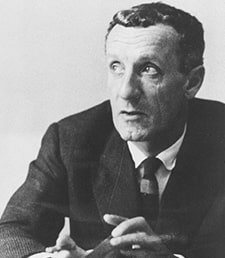Maurice Merleau-Ponty (1908-1961) was a leading philosopher and public intellectual in France after World War II. He was a proponent of existentialism and phenomenology, two schools of thought that focus on the individual’s experience and perception of the world.
Merleau-Ponty was associated with the existentialist movement in his early years, through his friendship with Jean-Paul Sartre and Simone de Beauvoir. He sought to integrate phenomenology with Gestalt psychology, psychoanalysis, Marxism, and Saussurian linguistics, and his work had a significant impact on these fields. He also read neurologist Kurt Goldstein and Gestalt theorists such as Wolfgang Köhler and Kurt Koffka.
Likewise, Merleau-Ponty’s work had a significant impact on later French thinkers, including Michel Foucault, Gilles Deleuze, and Jacques Derrida. This influence has often been underestimated, as the similarities and debts between the three thinkers are often not recognized.
Merleau-Ponty pursued secondary education at the Parisian lycees Janson-de-Sailly and Louis-le-Grand, completing his first course in philosophy with Gustave Rodrigues at Janson-de-Sailly in 1923-24. He achieved an “Award for Outstanding Achievement” in philosophy at his school that year, and he credits this course as being a significant influence on his decision to pursue philosophy as a career. He also achieved the “First Prize in Philosophy” at Louis-le-Grand.
When World War II broke out, Merleau-Ponty served for a year as a lieutenant in the 5th Infantry Regiment and 59th Light Infantry Division, but in June 1940, an armistice was signed between France and Germany. As the war subsided he was recognized for his bravery in combat. After several months of convalescence, he returned to teach at the Lycée Carnot in Paris, where he stayed from 1940 to 1944.
In 1940, he married Suzanne Jolibois and had a daughter. Merleau-Ponty renewed his acquaintance with Jean-Paul Sartre in 1940-41, and the two formed a resistance group that was resolved in after the arrest of two members.
In the following years, Merleau-Ponty published two of the most memorable and groundbreaking theoretical texts during his lifetime: The Structure of Behavior and Phenomenology of Perception. As well as other important publications on political philosophy, Humanism and Terror and Adventures of the Dialectic, and two books of collected essays on art, philosophy, and politics: Sense and Non-Sense, and Signs.
Two unpublished manuscripts surfaced after the author’s death: The Prose of the World, which was drafted around 1950-51 and The Visible and the Invisible, which he was possibly working on at the time of his death.
Merleau-Ponty’s thought continues to be influential beyond the usual areas of intellectual history. His work has even had a significant impact on researchers from a variety of fields outside of philosophy, including anthropology, architecture, the arts, cognitive science, and political theory.


